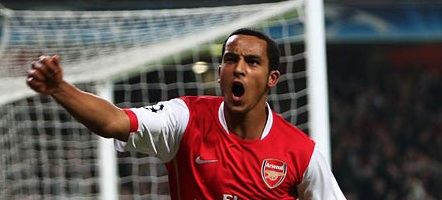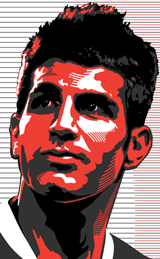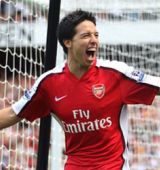THEO WALCOTT: “LA DECEPCIÓN”?
675 comments February 3rd, 2010

A short while after Robinho arrived at the Santiago Bernabeu amid much fanfare, Spanish sports daily Marca left readers under no illusions about just how underwhelmed they were with their much-heralded signing.
“LA DECEPCIÓN” screamed the headline – “The Deception”. Madrid had been promised a superstar and ended up with a spoilt baby – a player who’s character off the pitch was as inconsistent as his performances on it.
Arsenal only just dodged the Robinho-shaped bullet: in 2005 we gave him a tour of the training ground before he opted to sign for Madrid instead. Six months later, just as the Brazilian’s La Liga dreams were starting to crumble, Arsenal signed a player they believed to be an even bigger prospect. Robinho had been earmarked as a long-term replacement for Henry – now they had found a player who was younger, quicker, and even more surprisingly, English. Aged just 16, Theo Walcott arrived with a £12m price-tag and the hopes of a club on his shoulders.
Walcott’s first few months with the club are well documented. Despite not getting on to the pitch before the end of the season, he was selected for Sven Goran Eriksson’s 2006 World Cup Squad. He didn’t get a game there either, with other members of the squad reporting that Walcott was clearly out of his depth. Upon the resumption of the Premier League season, Theo found himself as a peripheral squad member, making a string of mixed cameos that culminated in his goal at the Carling Cup Final, against Chelsea.
Since then, the interruptions he has suffered from injuries have been so frequent as to disrupt any real pattern to his progress. Both shoulders have been operated on due to a congenital condition, and he’s suffered a succession of muscle injuries which may or may not be related. This season has been something of a nadir on the fitness front, with Walcott making just three league starts so far. The false dawn of his hatrick in Croatia has long since been eclipsed by injuries and inconsistency. Arsenal fans now face the question: Will Walcott ever be as good as we hoped? Can he still inherit Henry’s crown? Or, like Robinho, has his teenage talent dimmed? Is he another “decepcion”?
The arguments against Walcott feel particularly clear at the moment. It’s a well-known fact that his technical development is behind those of his age group, as he didn’t start playing the game until he was around 11 years old. Arsene has always been a firm believer that the time between 8 and 11 is critical in developing basic technique, though he was prepared to make an exception for Walcott on account of his extraordinary physical gifts.
On occasions, the gulf between Walcott’s athleticism and his ability causes comical results, as he sprints off in to the distance – forgetting to take the ball with him. He swings wildly at crosses and shots – a Walcott effort is as likely to end up in row Z as it is the top corner.
And yet, some do find the top corner. For all Walcott’s erraticism, there are moments of composure where he gets it just right. You want evidence? I’ll give you evidence.
He’s done some extraordinary things on the football pitch – things which some of the greats couldn’t even dream of:
And yet these make up a handful of moments in what is now four years of Walcott’s Arsenal career. The fans have given him plenty of time – a combination of his enthusiasm and his passport has long protected him from their jeers – but patience is starting to wear thin. We were promised the new Thierry, and we’ve got a player who on today’s form can’t hold a candle to Aaron Lennon, Ashley Young, or even Shawn Wright-Phillips. At the moment, I’m not sure even a fully fit Walcott would make the best Arsenal XI.
So where now? The next six months will be something of a litmus test for Walcott. Despite the famous hatrick that launched England’s qualifying campaign in such style, I think his World Cup spot is in serous jeopardy. Lennon has been far superior, and the form of Milner (as well as Capello’s inclination to pick Beckham) mean that it’s going to take an extraordinary run of performances, let alone good health, for Walcott to force his way back in to the 23. Unusually in this era of club over country, England will be Walcott’s principle motivation in the latter half of the season.
Come the end of the season, many will feel ready to judge Walcott. He’ll be 21 – a far cry from the boy who joined us. However, perhaps we’re best placed to give him more time. Due to his late entry in to the game, Walcott was never likely to be a top class footballer by the time he was twenty. Recently, a journalist asked Arsene to compare Theo and Milner, stating that they were “about the same age”. James Milner is 24. He emerged at Leeds as a 16-year old. It’s taken him eight years to reach the level where he is considered good enough to even sit on the bench for England.
Perhaps the answer is at least to wait until Walcott hits his mid-twenties before we consign him to the scrap-heap marked ‘Portsmouth’. I’d be ready to write him off now, were it not for one enormous factor: the judgment of Arsene Wenger. This is a man who saw something in Alex Song, when all I saw was the footballing equivalent of John Sergeant on Strictly Come Dancing. If Wenger believes Walcott will come good, I’m prepared to trust him.
Between now and May, the onus is on Walcott. To prove that he possesses the potential Arsene clearly believes he has. To prove that those great goals weren’t just flukes. To prove that he’s as good as his Nike ad suggests. To prove, once and for all, that he’s not a deception, but the real deal. Good luck, Theo – we’re rooting for you.






